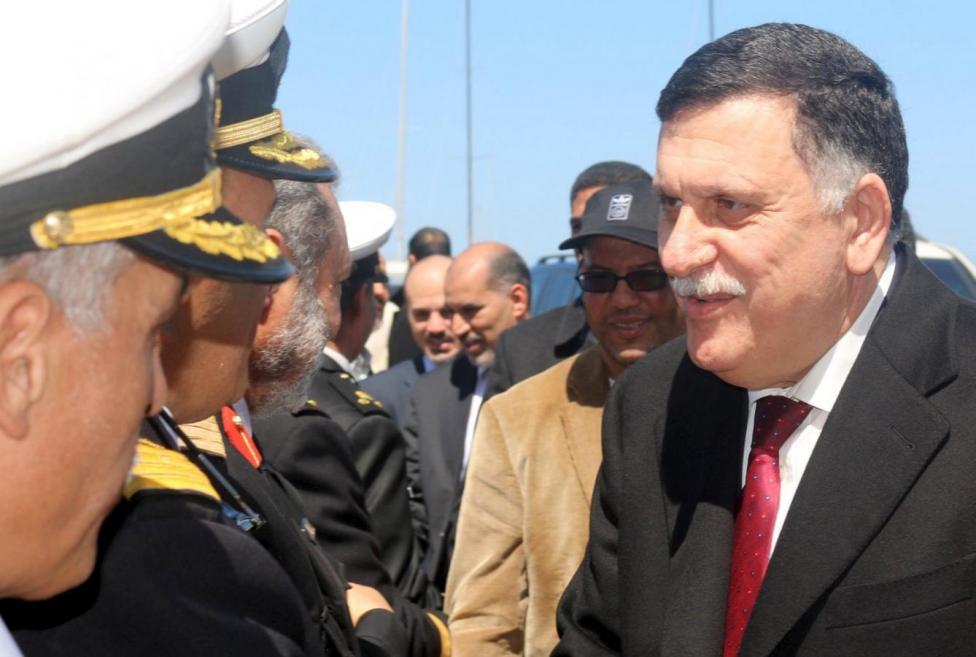Paris- The Prime Minister of Libya’s U.N.-backed Government of National Accord (GNA), Fayez al-Sarraj, announced that consultations have been launched to form a new cabinet in the coming weeks.
Sarraj spoke with Asharq al-Awsat in an interview carried out in Paris during his visit to meet with French President Francois Hollande.
Asharq al-Awsat asked, “The Libyan government is demanding to lift the embargo on weapons exports to Libya. Is there any progress in that matter?”
Sarraj replied that “there is an embargo on Libya’s import of arms …. It is no secret that Libya has a massive arsenal but when the GNA was formed and the Libyan National Army was being restructured – plus the Presidential Guard was launched- we saw that it is necessary to carry out a partial exemption of the embargo.”
“Did you achieve any progress in that regard?” asked the newspaper.
“We have started official procedures and communication with several parties. My presence in New York was an opportunity to hold a couple of meetings with the Foreign Ministers of Russia, the U.S. and others. During the meetings, I stressed the importance of lifting the embargo. As you know, such a decision requires a U.N. Security Council resolution,” replied the prime minister.
The newspaper asked, “The ministerial meeting on Libya in New York focused on the need to conduct a comprehensive dialogue and a national reconciliation. How are you going to achieve that? What are the obstacles preventing the army from being united under the supervision of one authority?”
The prime minister replied, “Libya’s Government of National Accord is based on security, economy and national reconciliation. At the U.N. General Assembly, a national initiative that includes all parties was launched without neglecting any side.”
“Practically speaking, what are the steps you are willing to take in the near future?” asked Asharq al-Awsat.
Sarraj answered, “We actually want to showcase the problems leading to division among Libyans. If it’s a struggle for authority, the GNA is only serving during this transitional phase until a new constitution is adopted and until elections are held. If the struggle is military, we suggest a prompt ceasefire in all areas.”
“It is known that one of the obstacles is the role and position of Libyan General Khalifa Haftar. How do you intend to deal with this topic under the framework of the national reconciliation?” asked Asharq al-Awsat.
“I previously met Haftar and it was a unique meeting full of transparency. In a civil country armed forces should fall under a political leadership; I think this is one of the points of contention between us … There is no veto against anyone and the new government welcomes everyone under the political authority,” answered Sarraj.
“What is required from you? Reducing the number of ministers, more diversity or a better representation of Libyan regions? How do you describe the new government’s philosophy?” asked the newspaper.
Sarraj denied receiving any official statement from the parliament concerning standards or regulations on forming the new government. “We are determined to have a government that represents equally all the regions and takes into consideration the current condition,” he said.
The newspaper asked, “Why does it feel like the war in Sirte has no outcome?”
“What we have done there is an achievement. In other regions, the fight against ISIS is ongoing for the past two years, and within months only we liberated Sirte and purged it from ISIS.”
Asharq al-Awsat asked, “Hungarian Prime Minister Viktor Orban requested that Libya establishes large camps for refugees on its territories so that they refrain from moving to Europe. What do you have to say about that?”
“I would like to stress that Libya is a transit country and not a final destination or importing country. Despite this, it has so far dealt positively with the huge number of migrants,” replied the Libyan Prime Minister.
